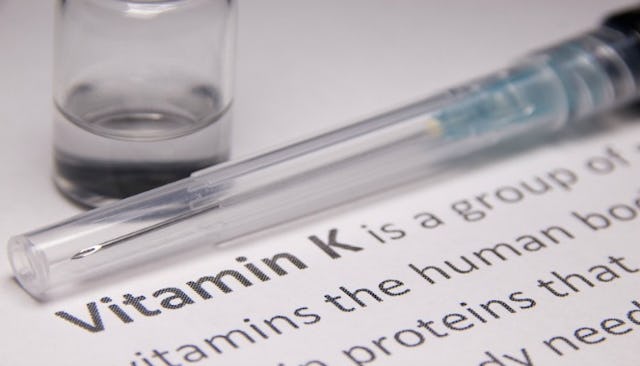What's A Vitamin K Shot, And Does My Newborn Actually Need It? (Yes)

When your baby was born, if they were born in a hospital, they were subjected to what we euphemistically call “newborn procedures.” They were weighed. They were measured. They took their fingertip pulse and checked their heartbeat. Then erythromycin ointment was squirted into their eyes to deter infection. They were given their first hepatitis B shot. And finally, they were given a shot of vitamin K.
Newborns have been getting a vitamin K shot ever since it became standard of care recommended by the American Academy of Pediatrics in 1961. This was after a definitive study showed, as Evidence-Based Birth says, that infants given 0.5 mg of vitamin K — either orally or by injection — had 5 times less risk of suffering bleeding during the first week of life. Out of 100,000 newborns, researchers estimated, the introduction of prophylactic vitamin K would save the lives of 160 infants. That’s a heck of a lot of lives saved with one vitamin dose.
But why vitamin K? Evidence-Based Birth tells us that vitamin K is necessary for clotting, and is actually named after the German word “koagulation.” The blood-clotting factors necessary are there at birth, but without sufficient vitamin K, they can’t be activated. As levels drop lower and lower, the blood loses the ability to clot entirely, and people can start to bleed spontaneously. Babies are born with very low stores of vitamin K because it doesn’t cross the placenta well, says the CDC, and there’s very little available in breast milk. In fact, humans don’t store it all too well in general. Therefore, the medical community agrees that all newborns have low stores of vitamin K. They need it from another source — the shot, without which babies are 81 times more likely to develop severe bleeding, says the CDC.
Giving vitamin K to all newborns prevents this from happening. It’s usually given as an injection; however, it can also be administered as a three-series dose in the first month of life. Britain’s National Charitable Trust notes that the shot likely confers greater protection; the dose is stored in the muscle and keeps levels higher for longer. Parents also often forget to give the subsequent two oral doses, so the baby isn’t given full protection. And science backs it up: Evidence-Based Birth says that when three oral doses of vitamin K are given, 1.4 to 6.4 infants out of 100,000 will develop late vitamin K deficiency bleeding (VKDB). With the shot, only 0 to 0.62 infants out of 100,000 will suffer from VKDB.
Late VKDB is the most dangerous kind. Evidence-Based Birth deliniates three different presentations of VKDB. The first, early onset VKDB, happens in the first 24 hours and usually only occurs when the mother is taking medication that interferes with vitamin K (certain blood thinners or seizure meds).
Classical VKDB happens from day 2–7, usually 2–3. Vitamin K stores are lowest at this point, and nursing and poor feeding are seen as risk factors for this presentation.
Late stage VKDB usually occurs during weeks 3–8 — though it can happen as late as 24 weeks. Unfortunately, bleeding in the brain is usually this presentation’s first sign. It happens to babies who are exclusively breastfed and did not get a vitamin K shot.
How dangerous is late VKDB? Very, shows Evidence-Based Birth. More than half of infants who develop it will have bleeding on the brain, and 20% will not survive. 40% of infants with VKDB may suffer long term brain damage. It’s almost impossible to tell if a baby is having a brain bleed, and parents can remain oblivious for a long time before realizing something is wrong, during which the bleeding can do catastrophic damage. In late 2013 and early 2014, seven infants between the ages of 7 and 20 weeks were diagnosed with VKDB in Nashville alone. Each child’s parents had refused the vitamin K shot. Though all the children survived, it’s not known to what extent they will suffer intellectual disabilities, according to The Tennessean. Their treatment? A vitamin K shot.
Health shill Mercola claims the shot is dangerous for several reasons. It causes pain right after birth, inflicting “psycho-emotional damage and trauma to a newborn.” He also says it’s crammed full of dangerous preservatives, and the dosage of vitamin K is much higher than needed. The CDC, on the other hand, assures parents that the shot is safe. The amount of preservatives in it is very, very small, and well tolerated even by preterm infants. Moreover, the amount of the vitamin is only high when compared to the daily dosage of vitamin K. Because babies have no reserve of the vitamin, it’s stored in the liver, where it’s released and used for clotting over a period of several months.
My family refused many of the standard newborn procedures. None of my babies had eye drops. None of my babies were given a hepatitis B shot. But every single one of my children was given a shot of vitamin K. When I read about the risks, I decided it just wasn’t worth it. I didn’t want my kids to suffer from brain bleeds, or worse, die from them. The shot was worth it to us. And it’s been worth it to parents since the AAP recommendation in 1961.